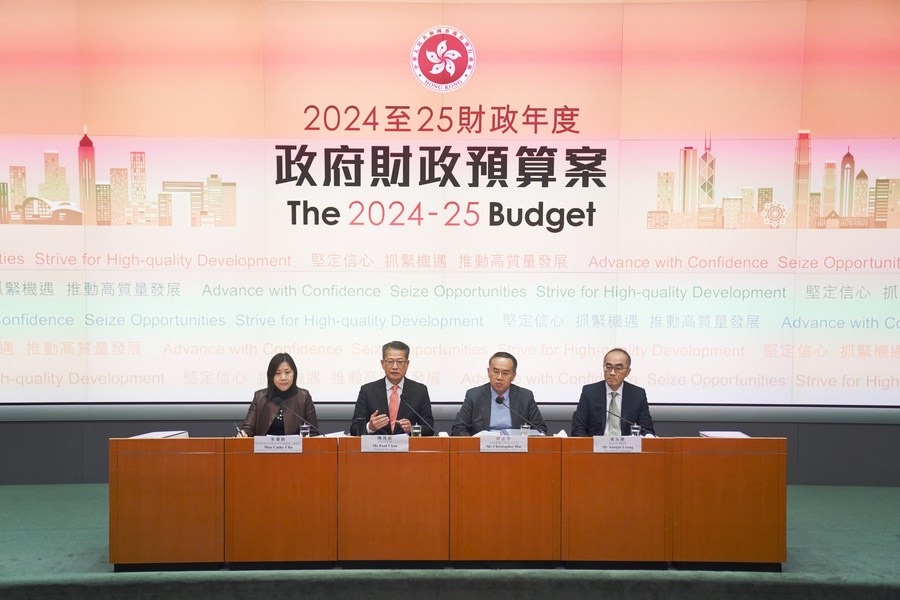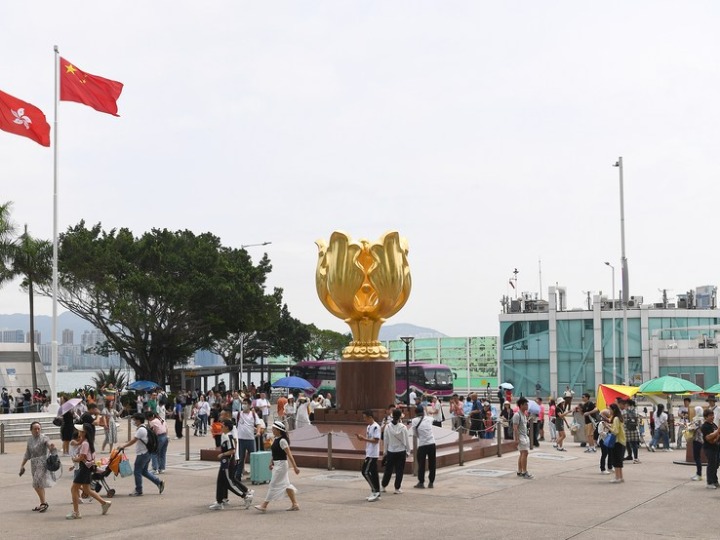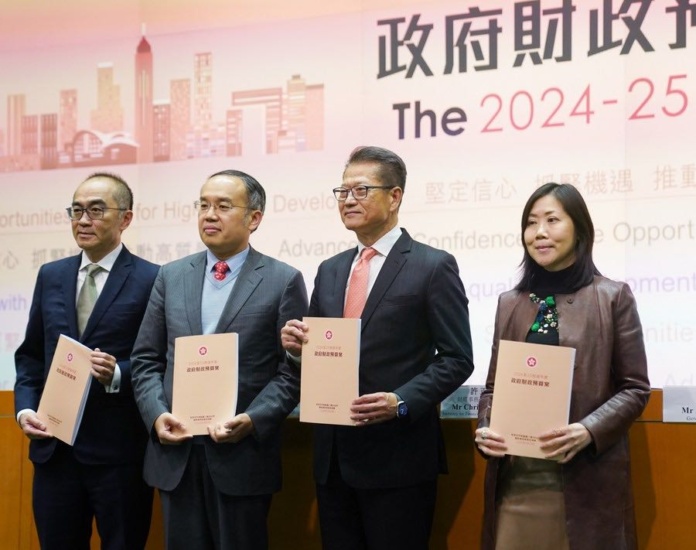The budget speech delivered by Hong Kong’s Financial Secretary Paul Chan has revealed that the Hong Kong government has been retaining its incremental style of reforms in dealing with its financial budget from 2024 to 2025. Most significantly, the budget was announced just a day after the visit of Xia Baolong to Hong Kong for his inspection study. Putting the two events together, the budget has tremendous political significance for the special administrative region.

The entire thrust of the budget is to control government expenditure and to increase government revenue by other means, notably the adjustment of fees and tax items based on the principle of “affordable users pay.” In 2024-2025, the total government revenue is going to be HK$633 billion and the total government expenditure is HK$776.9 billion. The forecast consolidated deficit in 2024-2025 is going to be HK$48.1 billion, with fiscal reserves forecast to be HK$685.1 billion by the end of March 2025. From 2025-2026 to 2028-2029, consolidated surpluses are anticipated, with fiscal reserves estimated at HK$832.2 billion by the end of March 2029.
The forecast consolidated deficit in 2024-2025 is going to be HK$48.1 billion, with fiscal reserves forecast to be HK$685.1 billion by the end of March 2025. From 2025-2026 to 2028-2029, consolidated surpluses are anticipated, with fiscal reserves estimated at HK$832.2 billion by the end of March 2029.
The fiscal consolidation program of the Hong Kong government adopts three principles: (1) the achievement of fiscal balance gradually and the maintenance of fiscal reserves at a prudent level; (2) the focus on expenditure cut, with some revenue increases included pragmatically; and (3) the allocation of resources for the provision and improvement of public services for the sake of taking care of the people’s needs.
In terms of controlling government expenditure, the civil service establishment is maintained at zero growth. The recurrent government expenditure is reduced by one percent in 2026-2027. The operation of the public transport fare concession scheme for the elderly and eligible persons with disabilities, namely HK$2 scheme, and the public transport fare subsidy scheme will be reviewed, but the government has no intention of cancelling these schemes.

For the capital works projects, the principle of cost effectiveness is adopted. They are adjusted in accordance with priorities and urgency. Work projects that are at the mature planning stage, such as the infrastructure works for the Northern Metropolis, are going forward as planned. But work projects that are currently at the preliminary planning stage have their implementation schedule adjusted.
Most importantly, the government proposes a two-tiered standard rates regime for salaries tax and tax under personal assessment, affecting only taxpayers with over HK$5 million net income and whose tax payable is calculated at the standard rate. Taxpayers on progressive rates will not be affected.
The two-tiered standard rates regime means that those people with net income above HK$5 million will have 16 percent tax rates – a very moderate increase. For those people with net income HK$5 million or below, the tax rates remain at 15 percent. Clearly, the reform is slightly progressive but very moderate.
The hotel accommodation tax is going to be three percent starting from January 1, 2025. Moreover, the government introduces a progressive rating system for domestic properties, affecting domestic properties with rateable value of over HK$550,000 only. For an annual rateable value of HK$550,000 or below, the rates percentage charges of five percent remain unchanged, covering 98 percent of the private residential flats. For annual rateable value of HK$550,001 to HK$800,000, the next rates percentage charges will be eight percent, affecting about 1.1 percent of the private residential flats. For annual rateable value above HK$800,000, the rates percentage charges will be 12 percent, affecting 0.8 percent of private residential flats. Overall, the adjustment in the rates percentage charges adopts a slightly progressive system in accordance with the increase in annual rateable value of domestic tenements.

While the government strives to increase its revenue through new measures, it is keen to maintain public confidence in the property market by cancelling the special stamp duty, buyers’ stamp duty and the new residential stamp duty for residential properties with immediate effect. This move has also made concessions to those groups lobbying the government for the cancellation of all these duties so that the property market can and will hopefully remain prosperous.
In the short run, the cancellation of various stamp duties will likely have a stimulating effect on the property market, where property buyers, including mainlanders, may be incentivized to buy properties; however, some observers have predicted that the property market would likely be hard-pressed to cool down and even drop, especially as the global and regional economy is far less optimistic than the predictions made by those with vested interests.
Overall, Paul Chan’s budget adopts the traditional budgetary principle of incremental reforms, demonstrating a conservative philosophy of public finance. Yet, this incremental conservatism has appeared to get the full support of the central authorities, especially as Xia Baolong, the director of the Hong Kong Macau Affairs Office, ended his 7-day visit on February 28, 2024.
Xia’s visit was politically important. His visit aimed at implementing the spirit of the speech delivered by President Xi Jinping in December 2023, when he met Hong Kong Chief Executive John Lee during the duty visit and report to Beijing. The President had previously emphasized the importance of Hong Kong changing “from chaos to governance, and from governance to prosperity.” Coming to Hong Kong toward the end of a one-month consultation period of Article 23 of the Basic Law, Xia’s visit appeared to achieve multiple objectives: (1) to implement the spirit of ensuring a smooth transition from governance to prosperity; (2) to listen to public views on the consultative document on Article 23 of the Basic Law (his meetings with lawyers and barristers); (3) to listen to the Hong Kong government on how it deals with the transition from “governance to prosperity;” and (4) to gather public views and to report to the central leadership prior to the forthcoming National People’s Congress meeting, where the mainland government’s report must touch on the development of the Hong Kong Special Administrative Region (HKSAR).
Judging from the places of visits by Xia Baolong, the central government attaches great importance to Hong Kong as an aviation hub (the first day of Xia’s visit to the international airport), an arbitration center for the Belt and Road scheme (his second day visit to the preparatory office of the international mediation center), and an international monetary and financial center (his meeting with the elites of the monetary and financial industries and with the businesspeople.

Furthermore, Xia’s meetings with the chairpersons and members of District Councils, the ordinary people in Shum Shui Po community center, the youth, the patriotic social groups and the media professionals showed that the central authorities attach immense importance to the livelihood issues and aspects of Hong Kong. Xia’s appeal to the people of Hong Kong to support the policies of the Hong Kong government was an important move that attempts to win the hearts and minds of the public, galvanizing their support just prior to the delivery of Paul Chan’s budget speech. As such, the budget content has acquired the full support of the central authorities in Beijing.
Xia also met the members of the Executive and Legislative Councils. During the meetings, he expressed the central government’s concern about Hong Kong’s economic development and livelihood issues, injecting his confidence over the future of Hong Kong. In a sense, Xia’s visit represented a rebuttal to some foreign critics who had lashed out at Hong Kong’s economic future. If the central authorities fully back up Hong Kong and have confidence in the HKSAR’s future, the ruling elites in Hong Kong, as Xia said, should feel confident in their policies toward the city’s economic development and livelihood improvement.
In conclusion, Paul Chan’s budget has been characterized by the traditional budgetary principle of incrementalism, meaning that any adjustment and reforms made to the budget are bound to be incremental, gradual and piecemeal. As such, the budget content is in line with the tenet of incremental changes; however, some reform elements are a small step toward a progressive tax regime, such as the higher tax rate for those net income exceeding HK$5 million and the progressive rating system for domestic properties. If any progressive tax and rating system can be seen as, broadly speaking, “socialist,” then the budget content is unprecedented. It is a good move in line with what the central authorities expect, namely Hong Kong’s tax regime can move slightly toward a more “socialist” system than ever before. Judging from the way in which Xia Baolong visited various places and met the people from a wide spectrum of the society, the budget is surely welcome by the central authorities, who expect the people of Hong Kong to support the local government’s policies and measures. After all, Hong Kong is expected and required to do a better job in its important transition period “from governance to prosperity,” especially in the twin areas of economy and the people’s livelihood.
*Sonny Shiu-Hing Lo is a political scientist, veteran commentator, and author of dozens of books and academic articles on Hong Kong, Macau, and Greater China




















